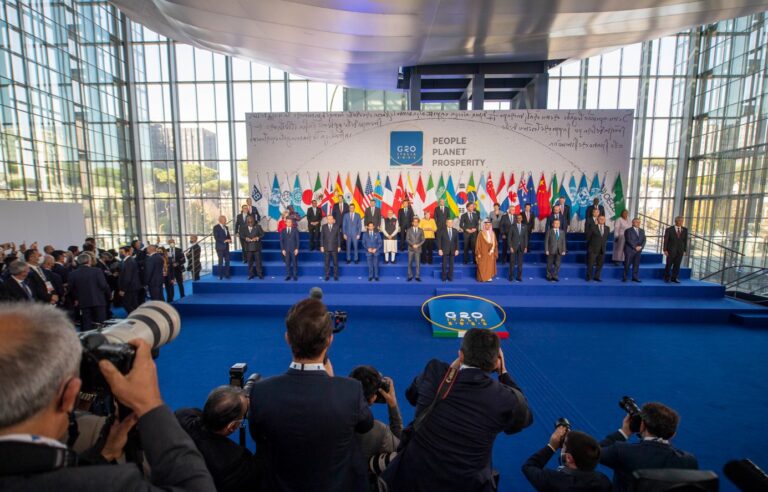You must have heard about the United Nations, which was established after World War II to maintain peace and security among nations. Well, how is global economic stability maintained? Is there any organization that looks after it? Yes, G20 is the summit that looks after global economic stability. Much like the United Nations acts as a beacon of peace, the G20 gathers the most influential nations on the planet to foster cooperation and promote stability. But what are G20 countries? Who are its members?
Table of Contents
What is G20 and how does it differ from G7?
The G20 (acronym for “Group of 20) refers to an informal international forum comprising the world’s top twenty economic giants. With an aim to restore and maintain global financial stability, it came into existence during the financial crisis of East & Southeast Asia in the 1990s.
Initially, it was mainly focused on macroeconomic issues. However, as time passed by, the forum also started exploring and discussing other arenas such as trade, health, energy, agriculture, environment, sustainable development, and anti-corruption. Besides these general issues, the global economy is still the main topic of discussion.
You must have heard of G7, which is somewhat similar to G20. This might lead you to think how these two are different from each other. The basic difference between the two lies in their membership. While G20 has a broader representation of 20 countries, G7 comprises only seven advanced industrialized nations.
The G7 focuses primarily on political and economic issues among its member nations. On the contrary, the G20 has a broader mandate, serving as a forum for discussions on a wide range of global economic challenges.
With some of the world’s largest and most advanced economies, the G7 Summit has been influential for ages. Whereas G20 has earned its influential figure in recent years.
Members of G20
Did you wonder about which member nations comprise G20? Well, in general, the G20 brings together 19 individual countries and the European Union, representing a diverse and formidable group of major economies from all corners of the world.
These members, namely, include Argentina, Australia, Brazil, Canada, China, France, Germany, India, Indonesia, Italy, Japan, the Republic of Korea, Mexico, Russia, Saudi Arabia, South Africa, Turkey, the United Kingdom, and the United States. All of these countries have about two-thirds of the world population. Not just this, they add up to contribute 75% to global trade and 85% to global GDP.
The G20’s membership criteria are primarily based on economic size and relevance, but the forum does not have a rigid set of requirements for participation. Instead, the selection of member countries is based on an informal invitation process, considering factors like economic performance, trade volumes, and geopolitical significance.
With the major economic players and emerging giants within the group, G20 reflects the diverse nature of the world’s economic landscape. Its inclusivity and informal structure facilitate candid discussions and collaboration, making it a crucial forum for charting the course of the global economy in an ever-changing world.
How does the G20 work?
The working of G20 begins with meetings at the working group level. This meeting involves officials from various member countries who gather to discuss specific issues and potential policy solutions.
Every member country must participate in the ongoing discussions and policy formulations. Moreover, each one has an equal say and voice within the group. Meetings are held throughout the year to discuss a broad range of topics.
These topics include macroeconomic policy coordination, financial market stability, trade, investment, sustainable development, energy, climate change, and more. The primary objective behind these meetings is to uncover the common challenges faced by the member nations and find plausible solutions to them.
Besides these regular meetings and discussions, the annual G20 Leaders’ Summit is also held. With the heads of government from each member country, the Summit focuses on the pressing issues faced in recent times. Besides this, the leaders also work on finalizing action plans for the common problems.
The G20 operates as a crucial platform for international economic cooperation and governance. By facilitating dialogue, collaboration, and consensus-building among the world’s major economies, it strives to address pressing challenges and mitigate financial risks. This way, it paves the way for a more stable, sustainable, and prosperous global economic landscape.
The strengths of G20 Summit
The G20 exhibits remarkable strengths and accomplishments. Its compact membership of 20 nations ensures agility in decision-making and adaptability to emerging challenges. Inclusivity is a hallmark, as the G20 invites countries, international organizations, and civil society groups to foster a comprehensive perspective on global issues.
Coordinated action bolsters the international financial regulatory system, and during the 2008 financial crisis, it swiftly deployed emergency funding. The G20’s endeavors also encompass reforms in international financial institutions, international tax system improvements, and advancements in trade facilitation. Notably, the G20 has taken significant strides in climate action, committing to carbon neutrality and releasing the G20 Climate Risk Atlas.
Read more: International Monetary Fund (IMF): what is it and what are its functions












